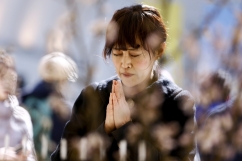At least nine people were killed and nearly 1,000 injured after a strong quake hit southwestern Japan, toppling houses and leaving thousands without power, but no problems were reported at nuclear plants in the area.
Strong aftershocks continued to shake the area around the city of Kumamoto on Friday, the morning after it was hit by the initial 6.0 magnitude quake.
While the magnitude was much lower than that of the March 11, 2011 quake that touched off a massive tsunami and nuclear meltdowns at Fukushima, the intensity was similar because the quake struck on land and at a much shallower depth.
More than 44,000 people evacuated to schools and community centres, some spending the night outside after the first quake hit around 9:30 pm. Roads cracked, houses crumbled, and tiles fell from the roof of Kumamoto Castle in the centre of the city.
"We managed to huddle into a space, that's why we were saved," one man told NHK national television. "Our house was destroyed, but we're all safe, so that's what counts."
More than 3,000 troops, police and firemen were dispatched to the area from around Japan, and Prime Minister Shinzo Abe said more would be sent if needed.
"We will do everything in our power to ensure the safety of local residents," Abe told a parliamentary committee.
Most of the dead came from Mashiki, a town of around 34,000 people near the epicentre of the quake, where firefighters battled a blaze late on Thursday. Daylight showed splintered houses under tiled roofs and an apartment building whose ground floor was pulverised.
"I want to go home, but we couldn't do anything there," one boy at an evacuation centre told TBS television as he bounced a baby in his arms.
Though the intensity of Thursday's quake on the Japanese scale matched that of the March 2011 quake that left nearly 20,000 dead, the absence of a tsunami and Japan's strict building codes helped keep the death toll down.
Service on the Shinkansen superfast train in Kyushu was halted after one train derailed, and highways were closed after some sections collapsed. About 12,300 households were without electricity as of 9 am local time (1 am GMT), according to Kyushu Electric Power Co Inc.
The Nuclear Regulation Authority said there were no irregularities at three nuclear plants on the southern major island of Kyushu and nearby Shikoku.
Honda Motor Co suspended output at its motorcycle factory near Kumamoto following the quake, a company spokesman said. Sony Corp, Mitsubishi Electric Corp and tyre maker Bridgestone Corp also suspended operations at factories in the area.














